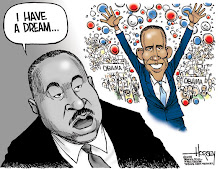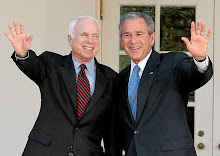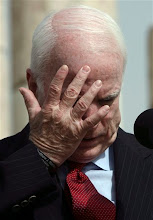Ben Adler
guardian.co.uk, Tuesday October 07 2008 14.10 BST
What disability agenda?
Since being nominated as John McCain's vice-president, Sarah Palin has reiterated what has become a consistent theme for her in this campaign: because of the birth of her son, Trig, with Down syndrome, four months ago, she would be an advocate for children with disabilities.
But Palin has not offered an agenda for special needs children.
Palin first rolled out her disability appeal to great applause at the Republican National Convention when she said: "To the families of special-needs children all across this country, I have a message: For years, you sought to make America a more welcoming place for your sons and daughters. I pledge to you that if we are elected, you will have a friend and advocate in the White House."
During last week's debate with Joe Biden, when asked what areas she would focus on as vice-president, she again raised the issue of children with disabilities. "John McCain and I have had good conversations about where I would lead with his agenda," Palin said. "That is energy independence in America and reform of government over all, and then working with families of children with special needs. That's near and dear to my heart also."
But what does that really mean? Advocates for people with disabilities can point to plenty of areas where they see a need for greater government support: healthcare, special education, protection from discrimination in the workplace. But Palin has neither championed these issues in the past nor made specific pledges to address them now.
Jim Dickson, vice-president for government affairs of the American Association of People with Disabilities (AAPD), says he has "mixed feelings", about Palin's highlighting of disability issues in her convention speech. "I was very moved by what she said," said Dickson. "But Trig is only four months old. She doesn't know what she's in for. She has no prior record in terms of her mayor's role or governor's role on disability issues. Nothing stands out."
For instance, the Individuals with Disabilities Education Act, the federal law that mandates equal educational opportunity for children with disabilities, has been consistently under-funded since its passage in 1975, according to education experts. But the McCain campaign does not propose any increase in overall federal education funding. And his bullet point plan makes no mention of special education. Obama calls for fully funding IDEA as part of his eight-page disability platform (pdf).
In general, disability rights advocates give both campaigns high marks for unprecedented outreach to the disability community. For the first time, both have staffers dedicated to cultivating the disability vote, and both have pledged to appoint a White House staffer to focus on disability issues.
The one issue where there is a major distinction, and disability advocates side with Obama, is the Community Choice Act. That bill, proposed by senator Tom Harkin and co-sponsored by Obama, would make government funds for institutional care available for home-based services so that more disabled people could remain in their homes. McCain opposes the bill because of concerns about cost. Palin, meanwhile, has come under fire for not supporting a bill that would have expanded children's health insurance in Alaska.
This does not mean that the McCain-Palin ticket has a desultory record on disability issues. Though Palin lays claim to the issue, McCain is actually the half of the ticket with a record of leadership on disability rights. McCain was an original co-sponsor of the landmark anti-discrimination law, the Americans with Disabilities Act (ADA). Dickson also praised McCain for having supported legislation to open voting accessibility to people with disabilities. McCain and Obama both supported the ADA Amendment Act, a bipartisan bill that just passed Congress, which will help clarify the protections in the ADA.
There are plenty of ways, from IDEA funding to expanded health coverage to Community Choice, that Palin could promise to serve the interests of people with disabilities. But so far Palin's pledge to lead on disability issues because of her personal connection to the community has not been developed into more than mere rhetoric. And unless she specifies what exactly she would do for disabled children as vice-president, she risks creating the impression that all she is really seeking with that rhetoric is political reward.
Subscribe to:
Post Comments (Atom)


























No comments:
Post a Comment